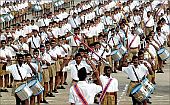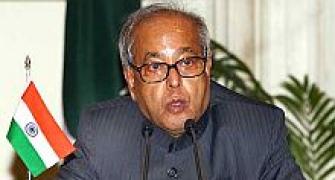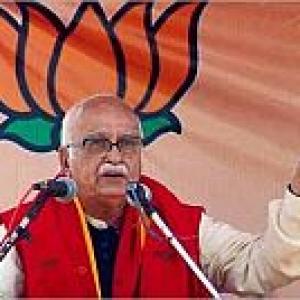 Dr Walter Andersen, an American expert who wrote the seminal book on the Rashtriya Swayamsevak Sangh titled Brotherhood of Saffron and was among the first to predict that the Bharatiya Janata Party would rise to power in India on the wings of its Hindutva ideology, has said the recent attacks by the RSS on the BJP leadership, particularly Lal Kishenchand Advani, it totally out of character.
Dr Walter Andersen, an American expert who wrote the seminal book on the Rashtriya Swayamsevak Sangh titled Brotherhood of Saffron and was among the first to predict that the Bharatiya Janata Party would rise to power in India on the wings of its Hindutva ideology, has said the recent attacks by the RSS on the BJP leadership, particularly Lal Kishenchand Advani, it totally out of character.
Andersen, who headed the South Asia division of the Intelligence and Research Bureau at the State Department for several years, said the RSS holding Advani responsible for the Lok Sabha debacle and its assailing the party leadership for creating a controversy with Jaswant Singh's expulsion for his book praising Jinnah and taking the pressure off Prime Minister Mamohan Singh over signing of the Indo-Pakistan Joint Statement in Sharm-el-Sheikh, was highly unusual for the Sangh Parivar.
"Generally, this kind of washing of dirty linen in public is highly unusual in the Sangh Parivar and violates one of its central positions on the importance of social solidarity of the group," he said.
Andersen, now associate director of the South Asian Program at the Johns Hopkins University's School of Advanced International Studies, told rediff.com: "Often it was the metaphor of the family that is used to explain the organisation, but something has changed and there are a few things that are critical," that has perhaps brought about this transformation.
He argued that when the BJP emerged as a governing party at the Centre in 1998-2004, and in several large states, "This brought all sorts of people outside the narrow Sangh perimeters into the party."
"Power also proved to be a temptation even for the more ideological, either because of a chance for exercising power or getting money."
Andersen said, "One has only to read the more committed Sangh newspapers and journals over the past decade to understand the angst over the impact of these temptations. Some have even argued that it would be best to stay aloof from the temptations of power entirely -- ironically sort of the view of Mahatma Gandhi and the Congress immediately after independence."
He said, compounding this irony was that the argument by Sangh Parivar that "appeals to the same deep current of selflessness and Sonia Gandhi, it should be recalled, gained enormous respect from her decision to stay out of the top ranks of power."
Andersen said, "The new sarsanghchalak, Mohan Bhagwat, is perhaps the most politically inclined head of the RSS since its founder Keshav Baliran Hedgewar some eight decades ago."
He pointed out that Bhagwat "has been taking a more active role than any previous sarsanghchalak since Hedgewar and that is having an effect in the party. Hedgewar, it should be recalled, was an active member in the Congress and the Hindu Mahasabha."
Andersen said, there was no doubt Bhagat was 'a superb organiser and chief administrator as the general secretary of the RSS', in his previous avatar "and he, like Hedgewar, is also very close to the pracharaks, who are the full time workers and the steel frame of the RSS and who form such a crucial base in all the affiliated organisations, such as the BJP."
He said although Bhagwat has often claimed "to be above mere politics," there was no denying that "he has spent his official life as an intermediary between the RSS and the BJP and issuing political statements, like a younger leadership is needed in the BJP and his criticism of Advani's role in the campaign."
Andersen, who in an earlier interview, immediately following the election results, had told rediff.com that the defeat of the BJP signalled the end of the political road for Advani and like ailing former Prime Minister Atal Bihari Vajpayee, would soon be put out to pasture, said the most recent salvo against Advani by the RSS was obviously to promote a revolt and bring in a new leadership in the party.
He said the recent criticisms by the RSS, specifically targeting Advani, was seemingly "to favour advancing either Arun Jaitley or Sushma Swaraj, both relatively young BJP figures, to the forefront of the party or Madhya Pradesh Chief Minister Shivraj Singh Chauhan, who has twice been chief minister and led the BJP to significant victories in this large Hindi-speaking state."
Andersen predicted that in the coming months and years "the RSS will play a more important role in vetting candidates, BJP officials and even policy," and added: "With the senior leadership under attack by the RSS, others have taken advantage of the opportunity to jump on the senior leadership and their presumed poor management of the party during the recent parliamentary campaign," and the other controversies that had emerged, including the Jaswant Singh furore.
He also said that the BJP's problem was further exacerbated because the party 'has no huge charismatic figure like Vajpayee to lead the party to redefine itself in a fast-changing India, much more prosperous and more actively engaged in world politics'.
Andersen said that Vajpayee also had immense credibility because he "was a senior RSS pracharak in an organisation that respects seniority."
He explained that "within the sangh parivar, the RSS leadership -- the pracharaks -- view themselves as somewhat morally superior to others and Vajpayee could not be lectured due to his senior position."
Andersen said it also helped that Vajpayee had "a manner of the wise old man that once could identify with and none of the older senior leadership possesses this quality. Furthermore, Vajpayee was a Brahmin and that high caste ranking still counts for something. So, given this relative power vacuum there is more open fight for power and an effort apparently by Bhagwat to fill a vacuum, despite all his disclaimers about this."
Regarding Jaswant Singh, and his expulsion by the BJP and then his being dismissed as a non-entity by the RSS, which led to Singh counter-attacking and describing the RSS as comparable to the white supremist Ku Klux Klan in the US, Andersen said it should not be forgotten that "Jaswant Sngh was never a member of the RSS or its affiliates when he joined the party. He had no real base in the pariwar, who did not support his appointment to a cabinet position by Vajpayee, but Vajpayee could get away with this because of his stature."
Andersen said, "When this book came out, it was time, in a sense, for the long knives to come out against him, particularly since he had criticised former Home Minister Patel, an icon for the sangh leadership. He praised Jinnah, still a demonised figure for many Indians and certainly for much of the Sangh Parivar."
He opined that Singh may have done so because "he may have genuinely felt that the Congress refusal to compromise with Jinnah on centralisation drove Jinnah reluctantly to support a separate state of Pakistan."
Andersen also said that "Jawant may also have felt that his criticism of Nehru for ultimately supporting partition would find a receptive audience in the Sangh Parivar since it has been a virtual doctrine of the parivar that partition was a tearing apart of the sacred soil of Mother India."
"But it did not -- and if you recall, Advani got into deep trouble for his praise of Jinnah, but could come out of it relatively well as he is a RSS pracharak with long years of service to the organisation and the parivar. In addition, one must keep in mind, Jaswant's close relationship with Nusli Wadia, Jinnah's grandson," for which he was now been attacked in the wake of the publication of his book as someone who could never be trusted.
Andersen said, "My guess is that Jaswant's long and close friendship (with Wadia) influenced his thinking about what Jinnah was trying to achieve."
On the question of whether the BJP was imploding, Andersen said, "The short answer is that it is going through an internal shakeup, and there might be some significant departures -- either forced or voluntary -- but I doubt that it will disintegrate, as some of the interpretations of 'imploding' seem to imply."
"The bottom line is that the BJP is still going through something of a post-election shake-up and how well it emerges from this depends keeping the loyalty of the core parivar base group while working out cooperative arrangements able to bring in new groups into the party and allies to the National Democratic Alliance. Vajpayee could do this. Advani not nearly as well."
Andersen said there was no assurance "if the next generation would do better, but the BJP needs to advance itself as an opposition party with distinct views on issues of importance to Indians, and especially the urban middle class Hindu base that has been the party's major support group."
But he predicted, "The party is likely to experience major turmoil before it reconstructs itself -- though I am relatively confident that it will do so."







